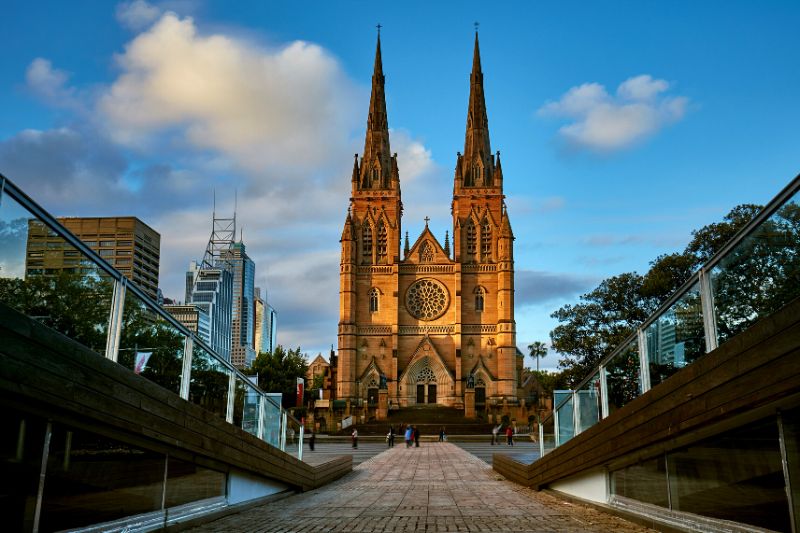Religion and politics are frequent bedfellows. In Australia the relationship takes various forms. Many clerics and bishops hold strong political views, and many lay Catholics are active within political parties, including as parliamentarians and government ministers on all sides.

Many issues are common to both state and church affairs. Currently this applies to so-called 'moral' issues like abortion and euthanasia and to so-called 'social' issues like global warming and gender equality and sexuality. Indigenous rights, including the recent Voice referendum, is another recent example of the mix of politics and religious morality. The church was divided. Some Catholics put the emphasis on the former, but many were in no doubt that it was a religious/moral issue.
Clerical and lay Catholics can show their political adherence in various low-key ways. Where various Catholic celebrities stand is often common knowledge but not trumpeted. Political party membership is generally kept private, but there are other general indicators. Some on the right show their ideological persuasion by public attendance at functions run by the Centre for Independent Studies, the Institute of Public Affairs, or Quadrant magazine. Some on the left reveal their public position by participating in or supporting Palm Sunday marches or demonstrations in favour of refugee rights or climate action.
Leaders of Catholic agencies sometimes have political backgrounds (presently there are two former Labor senators holding senior church positions, for instance), but it is presumed that their active participation in party politics, though not their personal allegiances, are left behind. When lay and clerical Catholics come together in church activities these allegiances are known, but not advertised. All are asked to leave their ideologies at the door.
This rule applied at the Plenary Council, for instance. We were asked not to advance agendas or to promote ideologies. Political differences were on clear display on the floor of the council, but they weren’t presented as such. This lowers the heat in the room and enables synodal discussions and spiritual conversations to proceed. Outside the room public condemnation of the stance of some council members in certain church media was fierce, but inside the council there was less of this sort of behaviour.
Against this background it was surprising to hear that the more than 100 Australian attendees at the recent right-wing Alliance for Responsible Citizenship (ARC) conference in London included the Archbishop of Sydney and the chief executive of Sydney Catholic Schools. ARC was the idea of controversial author Jordan Peterson. It had conservative billionaire backing (hence, reportedly, there were many free travel and accommodation packages for attendees). Australian attendees included familiar names among former and present Catholic politicians.
'The successful embedding of synodality within the church in Australia depends upon the existence, or at least the perception, of a certain amount of middle ground and of leaders who respect the diversity of views within the Australian Catholic community and act accordingly.'
Unsurprisingly one prominent Catholic was former Prime Minister, Tony Abbott. On the side lines of the conference Abbott launched an anti-climate action energy security paper produced by the Institute of Public Affairs. He proceeded to condemn the idea of any human-induced climate warming as a ‘climate cult’.
The tone of these comments was not unexpected, but Abbott is not an official church figure, and he is free to do as he pleases, despite his prominent presence at official church events.
What was more surprising was the presence of Archbishop Antony Fisher and church bureaucrat Dallas McInerney, though the latter is well-known as a major player in Sydney Liberal Party circles. Their decision to attend certainly nailed their right-wing colours to the mast on a range of contested social and moral issues.
The nature of this conservative conference meant that participation cannot be described merely as an educational exercise for official church leaders. It clearly had political intent, and the networking possibilities were clearly right-wing. Expect prominent figures from the conference, including Peterson himself, to begin appearing at church functions in Australia in certain dioceses.
This conservative gathering was happening at a time when many of the same issues are being discerned within the church at the 2023-24 Synod on Synodality. Archbishop Fisher came virtually straight from the Synod in Rome. The contrast could not be more marked between the Synod and the ARC conference and, for instance, between Abbott’s views on climate change and those expressed by Pope Francis at the Synod.
Such issues are also being discussed within Catholic parishes and schools in Sydney and are far from resolved. Parents, staff, and students in these schools who are not right wing on climate and gender equality, for instance, have every reason to be watchful.
The Sydney archdiocese is a powerhouse of conservative Catholicism in many ways. The presence of the Archbishop and the Schools CEO at this conference may be defended on the grounds that it removed forever the veil behind which shadowy politics operates within the church in Australia. Such transparency is welcome. But if that is the case then we are fast becoming like the American church where conservative billionaires and church leaders are bedfellows. The successful embedding of synodality within the church in Australia depends upon the existence, or at least the perception, of a certain amount of middle ground and of leaders who respect the diversity of views within the Australian Catholic community and act accordingly.
John Warhurst is an Emeritus Professor of Political Science at the Australian National University and was a member of the Plenary Council.
Main image: St. Mary's Cathedral in Sydney, Australia. (Xavier Arnau/ Getty Images)